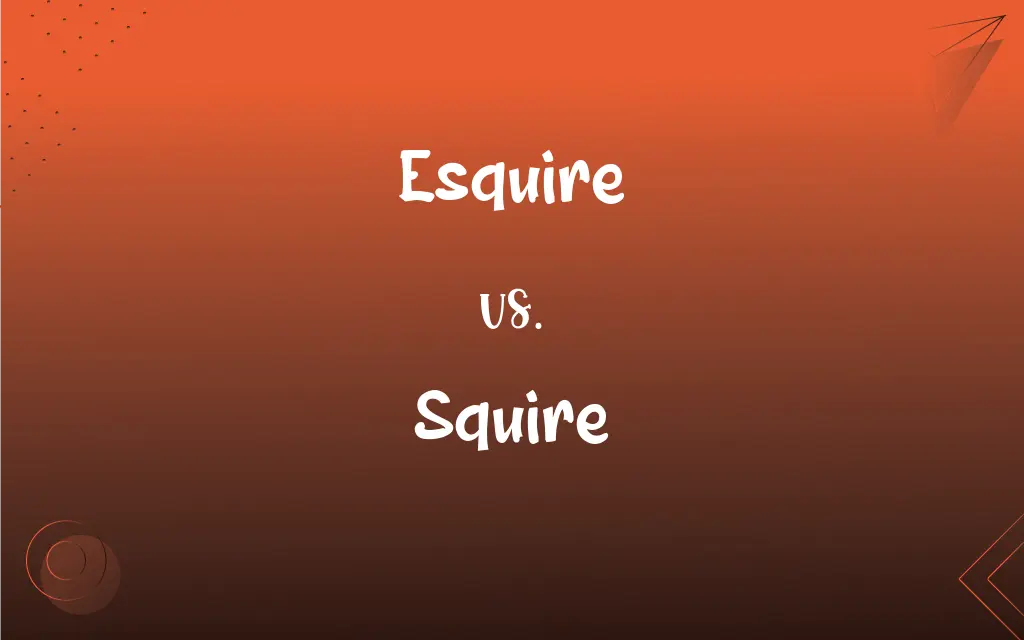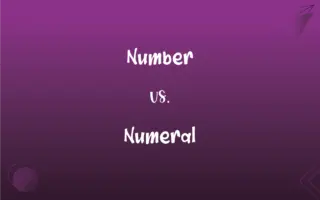Esquire vs. Squire: What's the Difference?
Edited by Harlon Moss || By Janet White || Updated on October 7, 2023
"Esquire" is a title of courtesy, often used after a man's surname, while "Squire" historically denotes a young nobleman or an English country landowner.

Key Differences
"Esquire" and "Squire" have their origins in British history but have evolved to have different implications in modern usage. "Esquire" is traditionally a title of courtesy, often placed after a man's surname. It was once used to denote someone who was a candidate for knighthood, implying a certain social standing. In contrast, "Squire" was initially used to refer to a young nobleman or knight's apprentice.
In the US, the term "Esquire" is commonly associated with attorneys. When used in correspondence or official documents, it signifies the individual's profession. Thus, seeing "John Doe, Esquire" typically indicates John Doe is a lawyer. "Squire" in the American context does not have a widespread professional connotation and retains more of its historical and British meaning.
In British history, "Squire" evolved from its initial use to refer to the principal landowner in a village or town. These squires held significant influence, given their position as landlords and community leaders. Meanwhile, "Esquire" became more generalized, serving as a polite formality in addressing men in formal communications.
Both "Esquire" and "Squire" carry a sense of respect and status, but their applications differ. "Esquire" leans towards formal recognition, often seen in written communications. "Squire" has more rural and historical connotations, reminding one of English countryside estates and the traditional gentry.
While both terms have historical roots in British culture, their modern interpretations and applications, especially in the US, have diverged. "Esquire" is more professional, particularly concerning legal professions, whereas "Squire" resonates more with historical English gentry and landownership.
ADVERTISEMENT
Comparison Chart
Definition
A title of courtesy
Historically, a young nobleman or landowner
Common Usage
Often used for attorneys in the US
Refers to the principal landowner in British towns/villages
Origin
Denoted candidates for knighthood
Referred to young noblemen or knight's apprentices
Modern Interpretation
Formal recognition, professional in the US
Historically tied to English gentry and landownership
Cultural Context
Widely used in the US for legal professionals
Retains British historical significance
ADVERTISEMENT
Esquire and Squire Definitions
Esquire
A term for a candidate for knighthood
He was known as an Esquire before his knighting ceremony.
Squire
A principal landowner in a town or village
The Squire owned most of the land in the village.
Esquire
A gentleman below the rank of knight
As an Esquire, he held certain social privileges.
Squire
A young nobleman
The Squire was eager to prove his valor in battle.
Esquire
In the US, a title often used for attorneys
Rachel Adams, Esquire, represented the defendant.
Squire
Historically, a knight's apprentice
As a Squire, he assisted the knight in his duties.
Esquire
Formally used after a man's surname
The letter was addressed to Mr. Alan Peters, Esquire.
Squire
A title for men of high social status, especially in past centuries
The Squire of the town was respected by all.
Esquire
A man or boy who is a member of the gentry in England ranking directly below a knight.
Squire
An English country gentleman
The Squire held an annual feast for the townspeople.
Esquire
Abbr. Esq. Used as an honorific usually in its abbreviated form, especially after the name of an attorney or a consular officer
Jane Doe, Esq.
John Doe, Esq.
Squire
A man who attends or escorts a woman; a gallant.
Esquire
Chiefly British A barrister-at-law.
Squire
An English country gentleman, especially the chief landowner in a district.
Esquire
In medieval times, a candidate for knighthood who served a knight as an attendant and a shield bearer.
Squire
A magistrate or justice of the peace.
Esquire
(Archaic) An English country gentleman; a squire.
Squire
A local dignitary.
Esquire
A lawyer.
Squire
A young nobleman attendant upon a knight and ranked next below a knight in feudal hierarchy.
Esquire
A male member of the gentry ranking below a knight.
Squire
To attend as a squire; escort.
Esquire
An honorific sometimes placed after a man's name.
Squire
A shield-bearer or armor-bearer who attended a knight.
Esquire
A gentleman who attends or escorts a lady in public.
Squire
A title of dignity next in degree below knight, and above gentleman. See esquire.
Esquire
(archaic) A squire; a youth who in the hopes of becoming a knight attended upon a knight
Squire
A male attendant on a great personage.
Esquire
(obsolete) A shield-bearer, but also applied to other attendants.
Squire
A devoted attendant or follower of a lady; a beau.
Esquire
(heraldry) A bearing somewhat resembling a gyron, but extending across the field so that the point touches the opposite edge of the escutcheon.
Squire
A title of office and courtesy. See under esquire.
Esquire
To attend, wait on, escort.
Squire
Term of address to a male equal.
Esquire
Originally, a shield-bearer or armor-bearer, an attendant on a knight; in modern times, a title of dignity next in degree below knight and above gentleman; also, a title of office and courtesy; - often shortened to squire.
Squire
(obsolete) A ruler; a carpenter's square; a measure.
Esquire
To wait on as an esquire or attendant in public; to attend.
Squire
(transitive) To attend as a squire.
Esquire
(Middle Ages) an attendant and shield bearer to a knight; a candidate for knighthood
Squire
(transitive) To attend as a beau, or gallant, for aid and protection.
Esquire
A title of respect for a member of the English gentry ranking just below a knight; placed after the name
Squire
A square; a measure; a rule.
Esquire
A title of courtesy or respect
John Smith, Esquire, invites you to his gala.
Squire
A shield-bearer or armor-bearer who attended a knight.
Squire
A title of dignity next in degree below knight, and above gentleman. See Esquire.
Squire
A male attendant on a great personage; also (Colloq.), a devoted attendant or follower of a lady; a beau.
Squire
A title of office and courtesy. See under Esquire.
Squire
To attend as a squire.
Squire
To attend as a beau, or gallant, for aid and protection; as, to squire a lady.
Squire
Young nobleman attendant on a knight
Squire
An English country landowner
Squire
A man who attends or escorts a woman
Squire
Attend upon as a squire; serve as a squire
FAQs
Can "Esquire" be used as a title, like Mr. or Dr.?
Yes, it's a title of courtesy, often placed after a man's surname.
Was a "Squire" someone who served a knight?
Yes, historically, a "Squire" was a knight's apprentice.
Is "Esquire" a professional qualification?
No, it's a title, but in the US, it's associated with attorneys.
Can I address any man as "Esquire" in a letter?
While possible, it's most appropriate for lawyers in the US or as a general courtesy in the UK.
Is "Esquire" commonly used outside the legal profession in the US?
No, its prevalent use in the US is with attorneys.
Is "Esquire" used for females?
Traditionally, it's male-specific, but in modern US legal contexts, female attorneys might also use "Esquire."
Does "Squire" have a modern equivalent in terms of job roles?
Not directly. Its historical significance relates to young noblemen or primary landowners.
Were all squires wealthy?
Not necessarily, but many were principal landowners and held local influence.
Were knights once called "Squires"?
Yes, before being knighted, they might be referred to as "Squires."
How common is the use of "Squire" today?
It's less common and mostly retains historical or cultural significance.
Do all lawyers use "Esquire" in the US?
While common, not all lawyers might use or prefer the title.
Does "Squire" imply a certain age?
Historically, it referred to young noblemen, but it evolved to mean principal landowners without a specific age connotation.
Does "Esquire" have a British origin?
Yes, both "Esquire" and "Squire" have British origins.
Is a "Squire" higher than a "Knight"?
No, historically, a "Squire" was below a "Knight" in terms of rank.
Is "Esquire" a noble title?
Not a noble title per se, but it denotes a social standing and courtesy.
Why do some lawyers have "Esquire" after their names?
In the US, it's a common convention to denote someone as an attorney.
Is "Squire" used in any modern professions?
Not as a direct professional title, but its historical and cultural significance remains.
Were there duties specific to a "Squire"?
Yes, they assisted knights and managed land, among other responsibilities.
Can "Squire" be used as a term of endearment?
It's not typical, but contextually, it could be used affectionately, especially with historical or cultural reference.
Is "Esquire" the same as "Sir"?
No, "Sir" is a title for knights, while "Esquire" was for those below knighthood.
About Author
Written by
Janet WhiteJanet White has been an esteemed writer and blogger for Difference Wiki. Holding a Master's degree in Science and Medical Journalism from the prestigious Boston University, she has consistently demonstrated her expertise and passion for her field. When she's not immersed in her work, Janet relishes her time exercising, delving into a good book, and cherishing moments with friends and family.
Edited by
Harlon MossHarlon is a seasoned quality moderator and accomplished content writer for Difference Wiki. An alumnus of the prestigious University of California, he earned his degree in Computer Science. Leveraging his academic background, Harlon brings a meticulous and informed perspective to his work, ensuring content accuracy and excellence.
































































